As the volume of health data increases from almost every avenue, the need for open, health-IT ecosystems has grown in parallel.
Advances in data aggregation, health IT interoperability, and cloud technology have created the perfect environment for the creation of lifelong health data footprints for people all over the world. Once developed, these digital footprints will span an individual’s entire life, following them through sickness and health and providing an unprecedented amount of data from a huge array of sources securely to healthcare providers. However, before we reach that point there are some obstacles that the health sector needs to overcome.
Currently, health data is spread across a variety of silos, in both primary and secondary care, and no single source has a complete view of an individual’s health. Adding to that is the influx of new data sources, both from within the health sector and from non-traditional sources such as social and environmental data. In order to meet the evolving health demands of the population and incorporate these new data, data sets and models – the platforms that bring together this data to present a complete view of the individual’s health must be open, scalable, and interoperable.
In parallel with the explosion of health data volume and sources, there is corresponding growth in applications and vendors who are creating new and innovative ways of making use of the data. Sources of health data must be open and give access to these vendors through application programming interfaces (APIs) or risk having their data source rendered irrelevant. Often these vendors are not from within the health sector, so data access must be granted in such a way that the data can be easily utilised while respecting health data fundamentals such as security and privacy.
In this new world of open data availability, speed and consistency will become of utmost importance. Health data insights will occur in real time as each new piece of information about an individual is analysed and combined with previous information.
This will allow clinicians to develop more accurate conclusions about their patient’s health. In the future, these capabilities will be further enhanced by technologies such as artificial intelligence, machine learning and augmented reality.
Because these insights will be generated from multiple data sources, access must be consistent and as transparent as possible while remaining totally secure. This will enable innovators to rapidly create new and exciting applications that bring significant value to an individual’s health data.
Healthcare is changing and data is the key to that evolution – platforms need to be open to this development, not closed.
Read about Orion Health’s open data platform, Amadeus, by clicking the link below.



